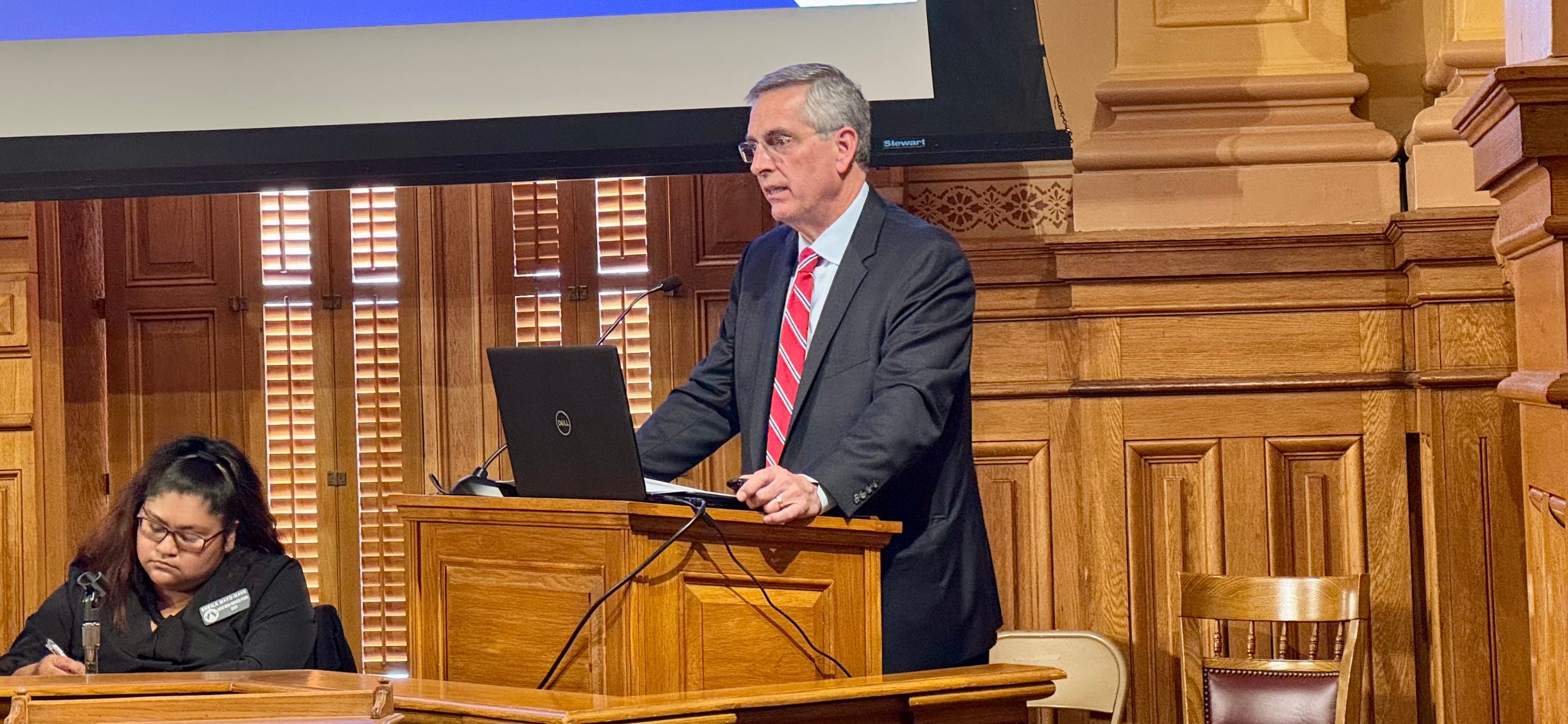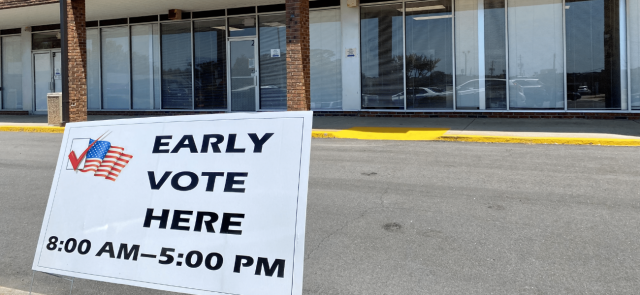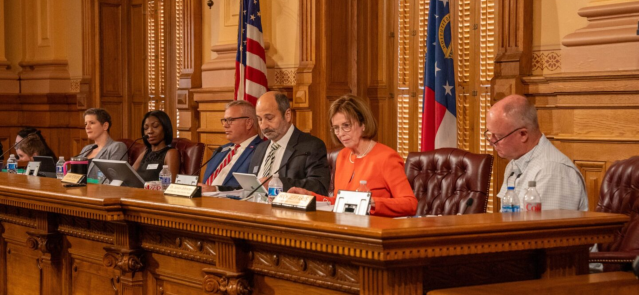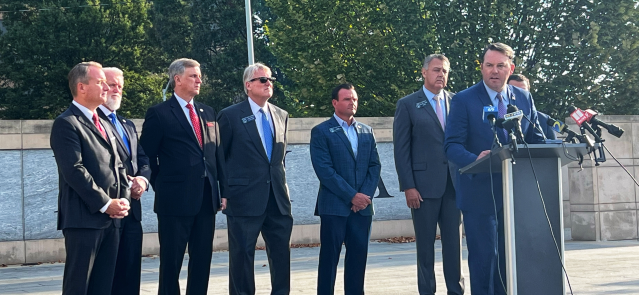Stay ahead of the curve as a political insider with deep policy analysis, daily briefings and policy-shaping tools.
Request a Demo
Secretary of State Brad Raffensperger discussed his office's proposed budget with lawmakers on Jan. 17, 2024. (Credit: Jill Jordan Sieder)
The head of the state Department of Human Services gave lawmakers on Wednesday an emotional overview of how the beleaguered agency finally found temporary homes for foster children living in hotels.
Commissioner Candice Broce was brought to the verge of tears as she talked about the problem that threw her agency into near-crisis and drew criticism most of last year.

Broce was one of 16 department heads who spoke to lawmakers about plans for their agencies and how money in the proposed amended fiscal year 2024 budget and the fiscal year 2025 budget will help them. The daylong hearings are part of a three-day budget appropriations process taking place at the Capitol through Thursday.
Broce told lawmakers her agency nearly exhausted its budget trying to find state-run facilities and foster homes for children with serious mental health needs who were living in hotels and offices. “ DFCS is no longer housing 50, 60, 70 kids in hotels and offices on a nightly basis,” she said. Now they’re handling a few emergency cases each night. Most nights, there are no children in hotels, she noted.
Broce’s agency investigates abuse of children and senior citizens, oversees adoptions and the foster care system, deals with Medicaid applications, helps single parents collect child support and runs the state’s food stamp program.
She thanked the governor for proposing $4.6 million for $3,000 pay increases for child protective workers and case managers , noting that case workers work long hours under tough conditions, and are often faced with threats to their personal safety when removing children from their homes. DHS will also benefit from $630,000 in new funding to pay for 23 new customer service staff to keep every county office open five days a week.
In addition, Kemp is recommending an allocation of $2.7 million in his amended fiscal year 2024 budget for Grace’s Place, a 24-bed residential facility that will provide substance abuse treatment and medical care for sexually exploited children and teens. Named for First Lady Marty Kemp’s Grace Commission, the facility is the first of its kind in Georgia.
As of Wednesday, lawmakers had heard from the heads of more than 30 state agencies, many of whom welcomed staff pay raises proposed in the upcoming budgets.
Here are other takeaways from day 2 of the Joint Appropriations hearings:
QR codes on ballots
Lawmakers peppered Secretary of State Brad Raffensperger about the use of QR codes used on ballots in voting and other voting technology. Several Republican lawmakers asked Raffensperger about the time and cost to shift to a new voting system that relies on ballots that can be easily read by eye, which they said voters trust more.
“I would support moving to human readable text,” said Raffensperger. “The challenge we have with the 2024 cycle is getting it done on time/ … We are feverishly building ballots for the primary season, including the presidential primary on March 12. And that’s the challenge we really have. We have so many elections in the election year of 2024.” The Secretary said he would come up with a budget for an alternative to a QR voting system for lawmakers at a later date. In the meantime, his budget request includes $4.7 million for QR code readers.
The Secretary of State’s office is also seeking $3.3 million to create a new, modern corporations filing software that would include new funding for fraud protection.
Salary increases for behavioral health staff
Department of Behavioral Health and Developmental Disabilities Commissioner Kevin Tanner said the $9.8 million allocated for $1,000 employee bonuses proposed by Gov. Kemp for behavioral health employees in FY2024 and a 4% cost of living increase in FY2025 will help with morale, recruitment and retention.
He noted the biggest workforce challenge in the department concerns the state psychiatric hospital workforce, which lost 1,200 employees during the pandemic. Tanner said 51% of those positions have been filled since July 2022 due to improvements in the pay package offered over the past two fiscal years, but noted that behavioral health staff are still being paid 19% below market.
Tanner said that the state lacks enough providers to care for people with intellectual and developmental disabilities, also due to below-market compensation, and praised the governor for including $79 million in funding for a long-sought provider compensation rate study that he predicts will result in a 40% rate increase for providers.
The state’s behavioral crisis centers are at 95% capacity and the state will need five more crisis centers by 2025 to handle the needs of people who need care, Tanner said. The governor has recommended fully funding one new behavioral crisis center in northwest Georgia in FY2025 at a cost of $9.4 million, and providing another $6.6 million to fund the operations of three crisis centers already in development.
Tanner is also seeking $88 million for capital improvements to state hospitals to replace HVAC systems, roofs, floors, doors and windows, to remediate water drainage and damage issues, and to replace drain and sewage lines.
Funds for Department of Labor staff and services
Department of Labor Commissioner Bruce Thompson told lawmakers the agency has deposited $115 million in penalties and interest on delinquent employer payments to the state treasury since he became head of the Department of Labor in January 2023. And there’s still more to retrieve.
“We currently have nearly $180 million in uncollected late fees and penalties from employers in our state that can be collected and sent to you at the state treasury,” Thompson said. “But I don’t have the people or the resources to collect it.”
The agency had 900 employees when Thompson started. There are now 825. The state’s Unemployment Insurance Trust fund sits at $1.55 billion. It should be $3.2 billion to be considered solvent, according to federal officials, Thompson said.
CFO Kate Furman said the agency needs 35 more people to handle calls from people seeking unemployment benefits. The 724,000 Georgians trying to call the labor department customer service line annually spend, on average, more than three hours on hold trying to file claims. More than half “abandon” their calls.
Thompson said the unemployment insurance system needs to be modernized, to replace an obsolete system that went online in 1986, and to migrate services for claimants and employers to the cloud, at a total cost of $58 million. The governor has recommended $7 million for such improvements in FY 2024, and another $5.5 million in 2025. Thompson said he had located $28 million in federal funds to use for the renewal project, but added, “We can’t continue implementing the plan without $18 million for 2025.”
More money to make license plates
Department of Revenue Commissioner Frank O’Connell noted that revenue collections grew 74% from 2015 to 2023, but remained flat last year, when state tax revenue totaled $36 billion.
He thanked the governor for recommending $1,000 bonuses and 4% cost of living increases for employees, and said the department is seeking more funds for the increased cost to manufacture license plates — $1.6 million in FY 2025.
He noted that by moving to a new, smaller building, the department will save the state $100,000 a month on lease payments in 2025, and said it can recover significantly more funds from delinquent corporate taxpayers if their request to spend $411,000 to fund six new tax examiners is met.
What’s next
Thursday, lawmakers will hear from department heads in the state’s judicial system such as the Department of Corrections and the Georgia Bureau of Investigation.
Richard Dunn, director of the Governor’s Office of Planning and Budget, will close out the week’s budget session Thursday afternoon.
Want to know more or follow along with this week’s budget hearings? You can view presenters’ budget documents here.
Catch up on day 1 of the budget hearings here:
Have questions? Contact Jill Jordan Sieder on X @journalistajill or at [email protected] and Tammy Joyner on X @lvjoyner or at [email protected].
And subscribe to State Affairs so you do not miss an update.
X @StateAffairsGA
Instagram@StateAffairsGA
Facebook @StateAffairsGA
LinkedIn @StateAffairs
Election administrators ‘in limbo’ over new voting rules, top official says
If you plan to hand-deliver your absentee ballot to your local election office this year, you’ll have to show identification and sign a form stating whose ballot you’re dropping off, under a new rule recently passed by the State Election Board. If you fail to show your ID or don’t complete the form, your ballot …
Weekend Read: State Election Board marks its 60th year mired in controversy. Here’s what happened.
In 1964, Georgia lawmakers retooled the state’s election process to create a “one person, one vote” system after the U.S. Supreme Court outlawed the “county unit system” that held sway over Peach State politics for nearly half a century. Until then, politicians hoping to win primaries in Georgia had to capture entire counties, not just …
State lawmakers: Atlanta, give detention center to Fulton to fix problem-plagued jail
Atlanta city officials need to give the Atlanta Detention Center to Fulton County to ease overcrowding in the county’s violence-prone jail, a bipartisan panel of state lawmakers said in its final report, released Friday. “A big part of the solution is that the City of Atlanta needs to turn over the Atlanta Detention Center to …
Georgia plays a prominent, although louder, role at this convention, too
As the second of the two biggest political party events wraps up this evening in Chicago with Vice President Kamala Harris accepting the Democratic presidential nomination, all eyes in Georgia are turning to the grand finale — the Nov. 5 election. “We are all energized because we know we are bringing back hope for our …



